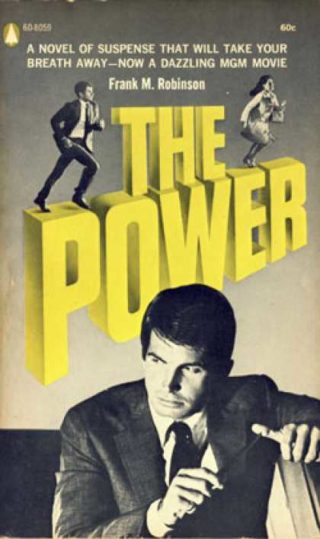 By FRANK M. ROBINSON (Popular Library; 1956)
By FRANK M. ROBINSON (Popular Library; 1956)
CARRIE, SCANNERS and quite a few other psychic horror fests are prefigured in this novel, the first by the famed pulp novelist Frank M. Robinson. After nearly sixty years THE POWER still holds up fairly well, marred only by the stifling 1950s-era conservatism that pervades it (which seems ironic considering the author is openly gay, and was a speechwriter for Harvey Milk).
It begins with a committee meeting held by the university professor Tanner, who’s researching pain thresholds. The meeting inadvertently reveals the existence of a Nietzschean superman among the group, i.e. an individual who has no worries or illnesses and boasts an absurdly high IQ.
Following the encounter John Olson, one of the meeting’s participants, dies under mysterious circumstances. It seems the superman of the group, identified as “Adam Hart” in a note left by Olson, is using telekinesis to make trouble for Tanner, as proven by an episode in which Tanner finds his consciousness hijacked by Hart.
The latter section, in which Tanner feels “as if he were drunk and there were a small kernel of sobriety in the back of his mind wondering why he was saying and doing the things he was,” is among the book’s most powerful. I also got a kick out of Tanner’s demented gambit for flushing out Hart: he elects to methodically track down and kill each of the committee’s surviving members. The nightmarish climax, set in an amusement park funhouse, is another highlight (although the psychedelic mental duel that concludes the otherwise-lackluster 1968 movie adaptation of this novel far outdoes it). As for the twist ending, in which we learn why it is that Hart’s mirth is focused on Tanner, it isn’t at all difficult to foresee.
The novel overall is a superlative chunk of pulp: action packed, suspenseful and unfailingly energetic. Again, though, the conservative air does the material no favors, with the story’s more perverse and aberrant undercurrents severely muted; nearly all the killings occur off-screen, and the fact that Hart sired numerous children with—gasp!—multiple partners is brought up early on but never mentioned again. This is a nifty book, in short, but I prefer my psychic thrillers with conflagrations and exploding heads.
